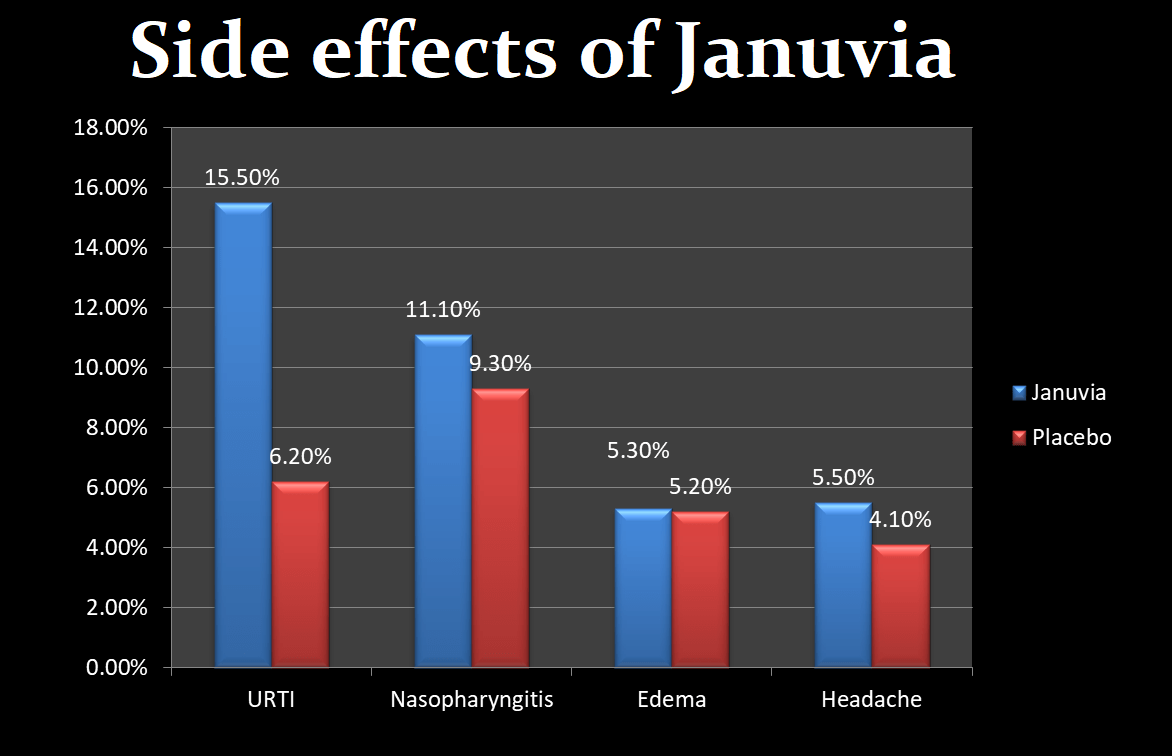Sitagliptin is a DPP-IV Inhibitor. It is a commonly used diabetes medicine. Sitagliptin side effects are usually mild in nature, however, severe anaphylaxis and pancreatitis have also been reported.
For mild sitagliptin side effects, the dose may be reduced, or treatment may be withheld for a few days. However, in cases of severe side effects, treatment should be discontinued.
Januvia (Sitagliptin): Use, Dose, Side effects, MOA, & WarningsSitagliptin side effects
Severe side effects of Januvia (Sitagliptin) include severe allergic reactions, pancreatitis, renal failure, and exfoliative skin conditions.
Hypersensitivity Reactions
The hypersensitivity or allergic reactions caused by JANUVIA may present as:
- Anaphylaxis
- Angioedema
- Hypotension
Hypersensitivity reactions are usually rapid in onset and present early in the start of treatment, usually within the first three months of treatment initiation. Sometimes these allergic reactions may occur after the first dose.
In case of an allergic reaction, treatment should be discontinued immediatley. Patients should be started on supportive treatment like intravenous fluids, corticosteroids, and/ or epinephrine injection.
Exfoliative skin condition:
An exfoliative skin condition is a type of allergic reaction that may present acutely. Patients may develop bullous eruptions and skin is denuded off.
Bullous pemphigoid is bullous eruption manifesting as the development of vesicles and bullae over the skin.
Patients who develop skin eruptions should discontinue the treatment. Supportive treatment should be initiated in the form of antibiotics, corticosteroids, or immunosuppressants.
Pancreatitis:
Sitagliptin, like other DPP-IV inhibitors, may cause acute pancreatitis. Fatal and non-fatal hemorrhagic or necrotizing pancreatitis has been reported with its use.
Patients should be watch carefully for the clinical signs and symptoms of pancreatitis. These may include:
- Abdominal pain that radiates to the back
- Nausea and Vomiting
- Anorexia
- Hypotension
If a person develops acute pancreatitis, treatment should be immediately discontinued. Appropriate treatment should be initiated in the form of intravenous fluids, antibiotics, and analgesics.
It is better to avoid Sitagliptin or any other DPP-IV inhibitor in the future if a person has a history of pancreatitis.
Renal Impairment
Januvia use has been associated with worsening renal functions. It should be used with caution, adjust the dose in patients with moderate to severe renal functions.
Furthermore, patients should be monitored for worsening renal functions
Severe body pains:
Sitagliptin side effects include body and joint pains. Patients may develop severe body and joint pains that may mimic a rheumatological or metastatic disease.
Severe pains can be so disabling that the patient might become totally bedbound. Observe the patient for new-onset of skeletal pains. Discontinue treatment immediately and treat appropriately.
Heart failure:
Heart failure has been observed in patients using sitagliptin. Patients should be observed for the clinical symptoms of heart failure.
These symptoms may include new onset of shortness of breath, shortness of breath on lying down, body swelling, apprehension, chest pain, and cough.
Treatment with sitagliptin should be discontinued and appropriate treatment in the form of oxygen, diuretics, and ACE inhibitors or Angiotensin receptor blockers may be commenced.
Hypoglycemia:
Sitagliptin is considered a euglycemic drug. It does not cause hypoglycemia. However, when combined with insulin or other diabetes medications, it may cause hypoglycemia.
Patients should be frequently monitored for the clinical symptoms and signs of hypoglcyemia. Dose reduction of Sitagliptin or the concomitant medicine may need to be reduced.
Other less severe side effects of Sitagliptin include:
The side effects caused by Sitagliptin as add-on combination therapy with metformin and rosiglitazone or pioglitazone, and in patients treated with placebo were:
- Upper respiratory tract infection (JANUVIA, 15.5%; placebo, 6.2%)
- Nasopharyngitis (JANUVIA, 11.0%; placebo, 9.3%)
- Peripheral edema (JANUVIA, 8.3%; placebo, 5.2%)
- Headache (JANUVIA, 5.5%; placebo, 4.1%).
Gastrointestinal side effects:
Abdominal symptoms are probably the most commonly reported adverse events associated with Sitagliptin.
Most patients present with the following symptoms:
- Abdominal pain
- Nausea
- Diarrhea
- Abdominal gases
- Flatulence
- Constipation
In summary:

The most common side effects caused by JANUVIA are:
- Runny or stuffed nose
- Sore throat
- Headache
- Diarrhea
- Nausea
The serious side effects caused by JANUVIA are:
- Swelling of the face, throat, and feet or ankles
- Ongoing pain that starts from the upper left or middle of the stomach but may spread to the back
- Fever
- Loss of appetite
- Nausea
- Vomiting
- Skin blistering or peeling, itchy skin
- Pain in joints
- Difficulty in breathing or swallowing
In any of the above symptoms, stop treatment immediately and consult your healthcare provider.
Sitagliptin Vs Vildagliptin